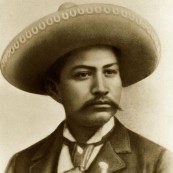Biography
José Juventino Policarpo Rosas Cadenas (25 January 1868 – 9 July 1894) was a Mexican composer, violinist, and band leader.
Rosas was born into a poor Otomi family, in Santa Cruz de Galeana, Guanajuato, now renamed Santa Cruz de Juventino Rosas. In his youth he did whatever he could related to music, from ringing church bells to playing violin on the street, making music for his living from age 7 on. He used music for his ambitions to better himself, including composing a waltz in exchange for a pair of shoes.
He moved to Mexico City and soon became a well known musician and composer. At age 12 he was playing violin in one of the city's most popular dance bands. In his early teens, he worked accompanying well known singer Angela Peralta. Although he applied twice for entrance to the National Music Conservatory and briefly studied there, he was mostly self taught.
Rosas led a large orchestra and a brass band that toured internationally.
Rosas's best known work is "Sobre las Olas" or "Over the Waves". It was first published by Rosas in 1884 when he was in New Orleans, Louisiana with the popular Mexican band at the World Cotton Centennial World's Fair. (It was later republished in Mexico and Europe in 1888, and 1891; these later years are sometimes incorrectly given as the piece's first publication date.) It remains popular as a classic waltz, and has also found its way into New Orleans Jazz and Tejano music. In the United States "Sobre las Olas" has a cultural association with funfairs, and trapeze artists, as it was one of the tunes available for Wurlitzer's popular line of fairground organs. The music for "Over the Waves" was used for the tune "The Loveliest Night of the Year", which was sung by Ann Blyth in MGM's film The Great Caruso. It remains popular with country and old-time fiddlers in the United States.
In 1893 he led a band at the World Columbian Exposition World's Fair in Chicago, Illinois.
Rosas died in Surgidero de Batabanó, Cuba. Fifteen years later, in 1909, his remains were brought back to Mexico.







![Top 100 der Klassik [CD 4 of 5]](http://static.classicalm.com/repository/collection-cover/small/1367-img1372594763111487.jpg)
